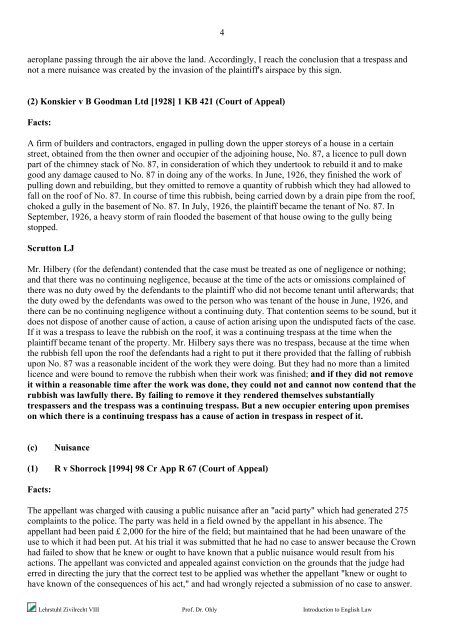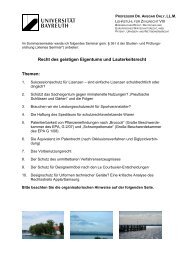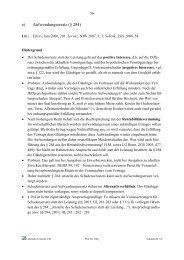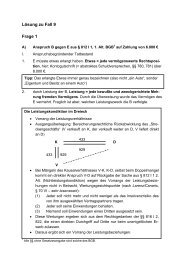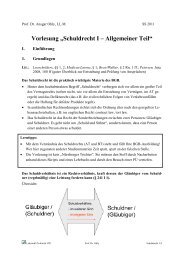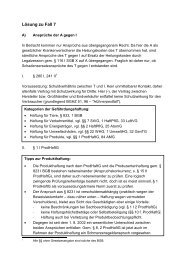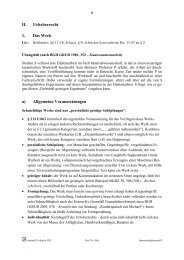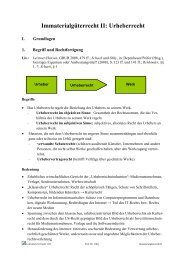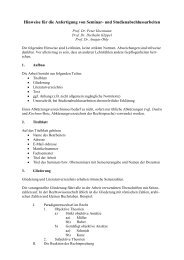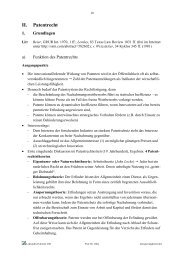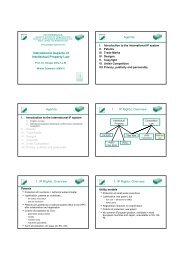3. Wrongful interference with goods, trespass to land, nuisance
3. Wrongful interference with goods, trespass to land, nuisance
3. Wrongful interference with goods, trespass to land, nuisance
Create successful ePaper yourself
Turn your PDF publications into a flip-book with our unique Google optimized e-Paper software.
4<br />
aeroplane passing through the air above the <strong>land</strong>. Accordingly, I reach the conclusion that a <strong>trespass</strong> and<br />
not a mere <strong>nuisance</strong> was created by the invasion of the plaintiff's airspace by this sign.<br />
(2) Konskier v B Goodman Ltd [1928] 1 KB 421 (Court of Appeal)<br />
Facts:<br />
A firm of builders and contrac<strong>to</strong>rs, engaged in pulling down the upper s<strong>to</strong>reys of a house in a certain<br />
street, obtained from the then owner and occupier of the adjoining house, No. 87, a licence <strong>to</strong> pull down<br />
part of the chimney stack of No. 87, in consideration of which they under<strong>to</strong>ok <strong>to</strong> rebuild it and <strong>to</strong> make<br />
good any damage caused <strong>to</strong> No. 87 in doing any of the works. In June, 1926, they finished the work of<br />
pulling down and rebuilding, but they omitted <strong>to</strong> remove a quantity of rubbish which they had allowed <strong>to</strong><br />
fall on the roof of No. 87. In course of time this rubbish, being carried down by a drain pipe from the roof,<br />
choked a gully in the basement of No. 87. In July, 1926, the plaintiff became the tenant of No. 87. In<br />
September, 1926, a heavy s<strong>to</strong>rm of rain flooded the basement of that house owing <strong>to</strong> the gully being<br />
s<strong>to</strong>pped.<br />
Scrut<strong>to</strong>n LJ<br />
Mr. Hilbery (for the defendant) contended that the case must be treated as one of negligence or nothing;<br />
and that there was no continuing negligence, because at the time of the acts or omissions complained of<br />
there was no duty owed by the defendants <strong>to</strong> the plaintiff who did not become tenant until afterwards; that<br />
the duty owed by the defendants was owed <strong>to</strong> the person who was tenant of the house in June, 1926, and<br />
there can be no continuing negligence <strong>with</strong>out a continuing duty. That contention seems <strong>to</strong> be sound, but it<br />
does not dispose of another cause of action, a cause of action arising upon the undisputed facts of the case.<br />
If it was a <strong>trespass</strong> <strong>to</strong> leave the rubbish on the roof, it was a continuing <strong>trespass</strong> at the time when the<br />
plaintiff became tenant of the property. Mr. Hilbery says there was no <strong>trespass</strong>, because at the time when<br />
the rubbish fell upon the roof the defendants had a right <strong>to</strong> put it there provided that the falling of rubbish<br />
upon No. 87 was a reasonable incident of the work they were doing. But they had no more than a limited<br />
licence and were bound <strong>to</strong> remove the rubbish when their work was finished; and if they did not remove<br />
it <strong>with</strong>in a reasonable time after the work was done, they could not and cannot now contend that the<br />
rubbish was lawfully there. By failing <strong>to</strong> remove it they rendered themselves substantially<br />
<strong>trespass</strong>ers and the <strong>trespass</strong> was a continuing <strong>trespass</strong>. But a new occupier entering upon premises<br />
on which there is a continuing <strong>trespass</strong> has a cause of action in <strong>trespass</strong> in respect of it.<br />
(c)<br />
Nuisance<br />
(1) R v Shorrock [1994] 98 Cr App R 67 (Court of Appeal)<br />
Facts:<br />
The appellant was charged <strong>with</strong> causing a public <strong>nuisance</strong> after an "acid party" which had generated 275<br />
complaints <strong>to</strong> the police. The party was held in a field owned by the appellant in his absence. The<br />
appellant had been paid £ 2,000 for the hire of the field; but maintained that he had been unaware of the<br />
use <strong>to</strong> which it had been put. At his trial it was submitted that he had no case <strong>to</strong> answer because the Crown<br />
had failed <strong>to</strong> show that he knew or ought <strong>to</strong> have known that a public <strong>nuisance</strong> would result from his<br />
actions. The appellant was convicted and appealed against conviction on the grounds that the judge had<br />
erred in directing the jury that the correct test <strong>to</strong> be applied was whether the appellant "knew or ought <strong>to</strong><br />
have known of the consequences of his act," and had wrongly rejected a submission of no case <strong>to</strong> answer.<br />
Lehrstuhl Zivilrecht VIII Prof. Dr. Ohly Introduction <strong>to</strong> English Law


